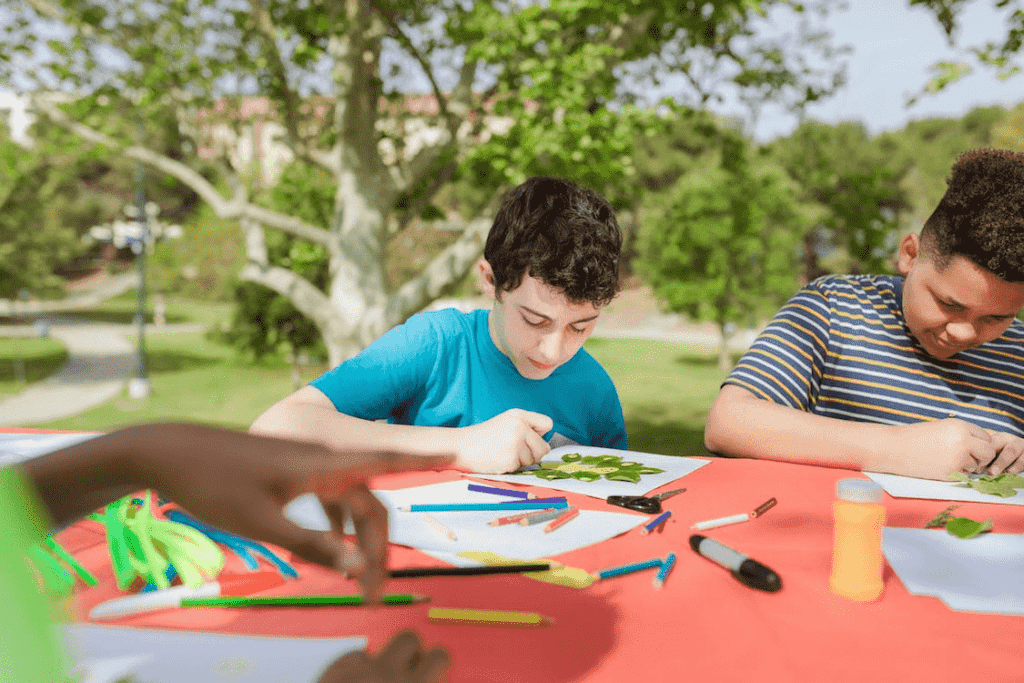In recent years, there has been a shift in parental perception around children’s development and growth. Previously, parents had an exclusive focus on academic excellence. Academic performance was given precedence, while skill-building, personal growth, and social development took a backseat.
Today, the culture has changed tremendously. While parents have a razor-sharp focus on helping their children secure top grades, they’re also cognisant of the importance of raising independent, responsible, curious, creative, thoughtful, and empathetic children.
In this blog, we’ll cover one of the most important skills: creativity. Why is creativity so important? Moreover, how can you help your children develop this invaluable skill? Keep reading!
1. The Importance of Creativity

Creativity is an extremely important skill for all students, especially young pupils. As children grow up, they’re naturally open, curious, experimental, and thirsty for knowledge. They ask a lot of questions and actively utilise their senses to explore the world around them.
Children get fascinated by different objects and love touching new things. They also love listening to different sounds and reacting to them, seeing exciting new things around them, exploring different scents, and tasting new foods and drinks. Each of the five senses is used in abundance: touch, hearing, sight, smell, and taste.
This is where the creative process begins. Children open themselves up to new adventures and explorations, which sparks their imagination. As parents engage with children and answer their questions with great thought and consideration, children become even more curious and creative.
This is a lifelong skill. Creative students are more insightful, open, innovative, and competent. They see the bigger picture and keep exploring new parts of it instead of restricting themselves. Creativity plays a big role in helping students explore exciting new opportunities in life, achieve success, and become expert problem-solvers. They think outside the box, break patterns, and achieve a greater sense of fulfilment.
Recommended Read: A Closer Look at the Art of Making Schooling Engaging and Fun for Young Children
2. No Question is Too Silly or Pointless!

As a parent, you shoulder the responsibility of helping your children become creative learners. Since parents spend the most time with their children and have the closest interactions with them, they have the power to build or dampen their children’s creativity.
For starters, it’s important to note that no question is too silly or pointless! Growing up, your child will ask you a ton of different questions. As a parent, ensure you answer each question, especially ones that may seem senseless!
This is your chance to steer your child’s creativity in exciting new directions. Avoid answering their questions with “I don’t know”. Even if you don’t know, you can always have fun with the answer and fine-tune your child’s imagination. Encourage questioning, and make sure you roll with the punches!
3. Plan More Adventures and Activities

Children love adventures and activities! They help students become more creative and open. As a parent, make sure you frequently plan excursions for your children. You don’t have to go all out. Even mundane tasks like going to the grocery store can turn into creative adventures. Point out a cereal box and ask your child what it looks like. The more you question your children, the better.
Instead of exclusively asking educational questions, throw some fun banter into the mix to tap into your child’s imagination. “What does that cloud look like?” “What would you do if you turned into a dragon right now?” “If you could fly right now, what’s the first thing you would do?” As silly as these questions may sound, they compel children to have fun with their thought process and get creative!
Planning outdoor adventures is a great way to expose your children to new places and activities. If you can plan a trip, even better! As your children learn about new cultures, meet new people, explore different traditions, taste exciting new cuisines, and explore new places, their imagination will run wild. And that’s exactly what you want!
Recommended Read: Fuelling Your Child’s Passion for Science
4. Choose the Right School for Your Child

While your child will spend a lot of time with you, they’ll also spend a lot of time in school! Choosing the right institution isn’t just important; it’s imperative. Your child should be taught by experienced, empathetic, kind, and fun teachers who can educate them and help them have an enjoyable, exciting time. Your child should also develop healthy friendships.
The creative process can easily get disrupted when children are stressed and anxious. This is why you need to be very careful when choosing a school. Make sure there’s no risk of school bullying. Additionally, the teachers should uplift, empower, reassure, inspire, encourage, and affirm your child, not neglect them.
Today, many conventional schools have a high student-teacher ratio. When there are up to 25 or even 30 students in a single classroom, the teacher cannot possibly engage with every student in a one-on-one capacity. Students receive less attention from their teachers, which stifles their creativity.
Make sure you select an institution with a low student-teacher ratio. At Cambridge Home School Online, we teach students in small classrooms of 8–10 pupils. Our teachers also deliver engaging, compelling, and fun lessons to help students learn better.
Moreover, we plan numerous activities and exercises to stimulate creativity and help children think outside the box! The right schooling call will also go a long way in helping your child become a bright, curious, imaginative, and fulfilled learner.
At Cambridge Home School Online, we proudly teach the Cambridge homeschool curriculum to students across the globe. As an esteemed and trusted online international British school, we’re the first choice for thousands of parents.
Explore our four competitive homeschooling programs: Primary Prep/Key Stage 2 (ages 7 to 10), Lower School/Key Stage 3 (ages 11 to 13), Upper School/IGCSEs (ages 14 to 16), and Sixth Form/AS & A-Levels (ages 17 to 19). If you’re ready to take the first few steps towards online schooling, use the following resources:
- Admissions Process
- Term Dates
- Application Form
- Scholarships & Bursaries
- Grades & Fees
- Online Reviews
Whether you’re interested in high school online learning, school options for working parents, secondary schools in the UK, or primary school programs, CHS Online should be your first consideration. We help prepare students and parents for the transition to ensure a smooth beginning. If you have any questions, our education specialists are more than happy to help!
—
FAQ
Why is creativity considered an important skill for children?
Creativity is vital for children’s holistic development as it encourages them to be open, innovative, and competent. It plays a significant role in making them expert problem-solvers and helps them explore new opportunities in life. Creative children have a greater sense of fulfilment and are more insightful.
How can parents foster creativity in their children?
Parents play a crucial role in nurturing their children’s creativity. They should take the time to answer all kinds of questions their children may have, no matter how silly or pointless they seem. Parents should also plan adventures and activities that stimulate their children’s imagination and curiosity.
What role do adventures and activities play in fostering creativity?
Adventures and activities, even simple outings like going to the grocery store, can spark a child’s imagination. By introducing them to new environments, cultures, and experiences, you allow their creativity to flourish. Questions posed during these activities can further fine-tune their imaginative thought process.
Why is choosing the right school essential for a child’s creative development?
The right school environment can significantly impact a child’s creativity. Schools with low student-teacher ratios, such as Cambridge Home School Online, can offer more one-on-one engagement, helping students to learn better. Teachers should be experienced, empathetic, and encouraging to help students tap into their creative potential.
What schooling options does Cambridge Home School Online offer?
Cambridge Home School Online offers four homeschooling programs: Primary Prep/Key Stage 2 (ages 7 to 10), Lower School/Key Stage 3 (ages 11 to 13), Upper School/IGCSEs (ages 14 to 16), and Sixth Form/AS & A-Levels (ages 17 to 19). The school is trusted by thousands of parents across the globe and provides resources like an admissions process, term dates, application forms, scholarships & bursaries, and online reviews.